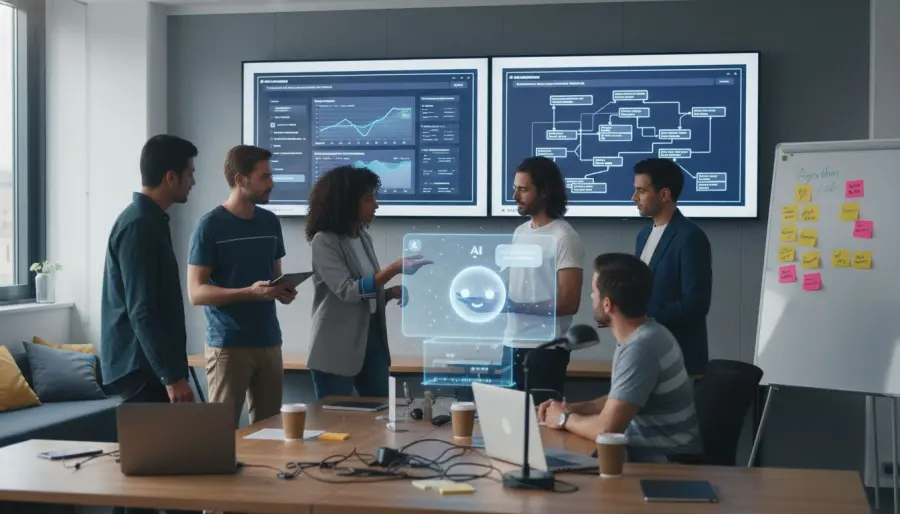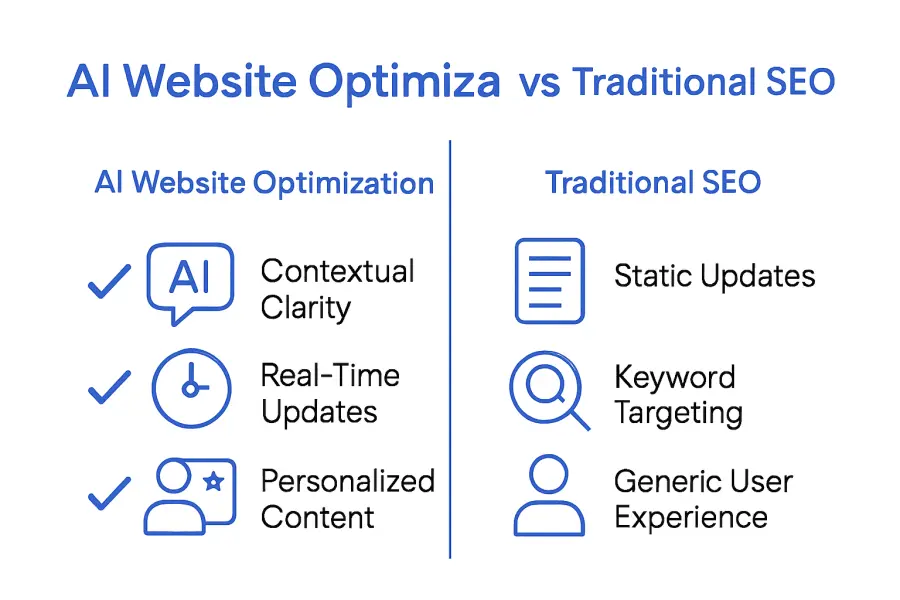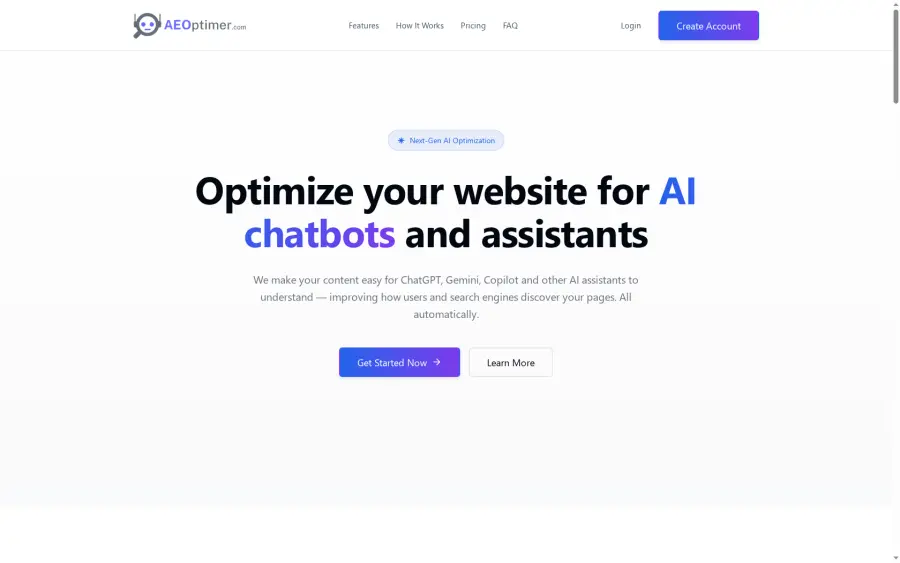Why AI Optimized Websites: Complete Guide 2024

Nearly 70 percent of online experiences begin with a search engine, yet most websites are built for people first and algorithms second. As machine learning and AI-driven search reshape how we find information, a new breed of websites is emerging that communicate as clearly with bots as they do with humans. Understanding the core concepts behind AI optimized websites can help anyone make smarter choices about building a site that stands out in a world where intelligence and clarity matter more than ever.
Table of Contents
- What Are AI Optimized Websites? Core Concepts
- Key Features of AI Website Optimization
- Benefits and Use Cases for Businesses
- Risks, Costs, and Common Mistakes
- Comparing AI Optimization with Alternatives
Key Takeaways
| Point | Details |
|---|---|
| AI Optimization Focus | Emphasizes semantic clarity and contextual coherence to enhance user engagement and AI algorithms’ understanding. |
| Dynamic Adaptation | Utilizes real-time content adjustments based on user interactions and predictive analysis for improved relevance. |
| Personalization | Offers tailored content experiences by adapting to individual user behavior and preferences for enhanced engagement. |
| Risks and Oversight | Highlights the need for maintaining human oversight to avoid quality inconsistencies and ensure meaningful connections with audiences. |
What Are AI Optimized Websites? Core Concepts
AI optimized websites represent a sophisticated digital strategy designed to enhance content discoverability and interaction with artificial intelligence systems. Unlike traditional websites, these platforms are strategically structured to communicate effectively with large language models and AI search algorithms. According to Wikipedia, an adaptive website dynamically adjusts its structure and presentation based on user interactions, creating a responsive digital environment that learns and evolves.
At their core, AI optimized websites focus on creating semantic clarity and contextual coherence. Wikipedia defines artificial intelligence optimization (AIO) as a method that aligns digital content with mechanisms used by large language models, prioritizing retrievability and intelligent comprehension. This means crafting content that goes beyond traditional keyword optimization to understand and match the intricate processing patterns of AI systems.
Key characteristics of AI optimized websites include:
- Structured data markup that helps AI understand content context
- Semantically rich language that supports machine learning comprehension
- Clear, concise information architecture
- Dynamic content adaptation capabilities
- Enhanced metadata and schema implementations
The primary goal of these websites is to create a symbiotic relationship between human readers and AI algorithms. By designing content that is simultaneously user-friendly and machine-interpretable, businesses can significantly improve their digital visibility and engagement potential. Think of it like creating a universal language that speaks fluently to both human visitors and AI assistants, bridging communication gaps in the digital ecosystem.
Key Features of AI Website Optimization
AI website optimization represents a transformative approach to digital content strategy, leveraging advanced technologies to enhance website performance and user engagement. Seeders highlights that this process involves streamlining keyword research, personalizing content, and predicting emerging search trends to maintain a competitive advantage in the digital landscape. By integrating intelligent algorithms and machine learning techniques, websites can now adapt and respond more dynamically to user needs and search engine requirements.
According to ComputerTec, key features of AI website optimization include implementing sophisticated technologies that dramatically improve user interaction. These technologies encompass AI-driven personalized content delivery, intelligent chatbot systems for real-time assistance, and predictive search functionalities designed to enhance overall user engagement. The goal is to create a more intuitive, responsive, and intelligent web experience that anticipates and meets user expectations before they are explicitly expressed.
Critical components of AI website optimization include:
- Intelligent Content Personalization: Dynamically adjusting content based on user behavior and preferences
- Predictive Search Algorithms: Anticipating user queries and providing preemptive information
- Automated Content Optimization: Continuously refining website content for maximum relevance
- Real-time User Experience Adaptation: Modifying website structure and presentation instantly
- Advanced Analytics and Insights: Generating deep understanding of user interactions
The ultimate objective of these AI-powered optimization strategies is to bridge the gap between complex technological capabilities and user-friendly digital experiences. By implementing smart, adaptive technologies, websites can create more meaningful, responsive, and engaging interactions that not only attract users but also retain their interest through intelligent, context-aware design and content delivery.
Benefits and Use Cases for Businesses
AI website optimization is rapidly transforming how businesses approach digital strategy, offering unprecedented opportunities for growth and engagement. Dev highlights that businesses can significantly benefit from AI technologies through enhanced user engagement, personalized content strategies, and automated marketing insights. This technological revolution enables companies to move beyond traditional marketing approaches, creating more intelligent and responsive digital ecosystems.
According to SpaceLoad, AI SEO provides businesses with advanced capabilities in keyword research, smart content optimization, and technical SEO automation. These tools enable organizations to achieve better search rankings and dramatically improve user experience. By leveraging machine learning algorithms, businesses can now analyze complex user behaviors, predict trends, and create highly targeted content strategies that resonate with specific audience segments.

Key benefits for businesses implementing AI website optimization include:
- Cost-Effective Marketing: Reducing manual research and optimization efforts
- Enhanced User Personalization: Delivering tailored content experiences
- Predictive Performance Analytics: Understanding user interaction patterns
- Competitive Intelligence: Gaining real-time insights into market trends
- Scalable Content Strategies: Automating content creation and optimization processes
The strategic implementation of AI optimization represents more than just a technological upgrade. It’s a fundamental shift in how businesses approach digital communication, transforming websites from static information platforms to dynamic, intelligent systems that actively engage and respond to user needs. By embracing these technologies, companies can create more meaningful connections, drive higher conversion rates, and stay ahead in an increasingly competitive digital landscape.
Risks, Costs, and Common Mistakes
AI website optimization comes with a complex landscape of potential challenges that businesses must carefully navigate. Dev highlights significant risks including substantial data privacy concerns arising from extensive data collection processes, potential quality inconsistencies in AI-generated content, and the considerable resource investments required for effective implementation. These challenges underscore the importance of a strategic and measured approach to AI integration.
SpaceLoad emphasizes that one of the most critical mistakes businesses make is over-relying on AI technologies without maintaining crucial human oversight. This can result in content that lacks depth, authenticity, and meaningful connection with the target audience. The danger lies in treating AI as a complete replacement for human creativity and strategic thinking, rather than viewing it as a powerful collaborative tool that augments human capabilities.
Key risks and potential pitfalls in AI website optimization include:
- Data Privacy Vulnerabilities: Potential misuse of collected user information
- Content Homogenization: Risk of generating generic, indistinguishable content
- Algorithmic Bias: Inherent limitations in AI’s understanding of nuanced contexts
- High Initial Investment: Significant upfront costs for implementation
- Technical Complexity: Requirement for specialized skills and continuous learning
Successful AI website optimization demands a balanced approach that combines technological innovation with human insight. Businesses must view AI as a sophisticated assistant rather than a complete solution, maintaining active oversight, regularly auditing AI-generated content, and ensuring that the core human elements of creativity, empathy, and strategic thinking remain central to their digital strategy. The most effective implementations will be those that leverage AI’s computational power while preserving the unique value of human intelligence and emotional understanding.
Comparing AI Optimization with Alternatives
AI website optimization represents a transformative approach that fundamentally differs from traditional digital marketing strategies. Wikipedia highlights that artificial intelligence optimization emphasizes semantic clarity and contextual coherence, distinguishing itself by meticulously aligning content with the intricate processing mechanisms of AI systems. Unlike conventional methods that rely on static keyword targeting, this approach dynamically adapts to the evolving landscape of machine learning and intelligent search algorithms.
Wikipedia explains that generative engine optimization focuses specifically on enhancing content visibility within AI-generated search results, which contrasts sharply with conventional SEO techniques that primarily target traditional search engine algorithms. This nuanced approach requires a more sophisticated understanding of how artificial intelligence interprets, categorizes, and presents information, moving beyond simple keyword matching to comprehend deeper contextual relationships and user intent.
Key differences between AI optimization and traditional approaches include:
- Contextual Understanding: AI optimization prioritizes semantic depth over keyword density
- Dynamic Adaptation: Continuous learning and real-time content adjustment
- Predictive Analysis: Anticipating user needs instead of reactive optimization
- Holistic Content Strategy: Focusing on comprehensive user experience
- Intelligent Personalization: Tailoring content to specific user behaviors
The evolution from traditional SEO to AI optimization represents a fundamental shift in digital strategy. Where previous methods relied on mechanical tricks and formulaic approaches, modern AI optimization demands a more nuanced, intelligent framework that respects both technological capabilities and human complexity. Businesses that embrace this approach will find themselves better positioned to create meaningful digital experiences that resonate with both machine algorithms and human audiences.
Here’s how AI website optimization compares to traditional SEO approaches:

| Aspect | AI Optimization | Traditional SEO |
|---|---|---|
| Content Focus | Semantic clarity Contextual depth |
Keyword density |
| Adaptability | Real-time dynamic updates | Static, periodic updates |
| Personalization | User behavior-based tailoring | Limited personalization |
| Predictive Capabilities | Anticipates user needs | Reactive to past trends |
| Technology Integration | Machine learning AI algorithms |
Manual tools |
| Content Strategy | Holistic user experience | Search ranking optimization |
Unlock the Full Potential of AI Optimized Websites Today
The challenge of making your website truly AI-friendly is real. As the article outlines, semantic clarity, structured data, and dynamic content adaptation are no longer optional but essential for standing out in AI-driven search results. You want your site to speak the language of AI assistants like ChatGPT and Gemini without needing a full website overhaul or complex technical skills. That is exactly where aeoptimer.com becomes the perfect solution.

Take control of your website visibility with automated AI optimization that works continuously behind the scenes. From automated sitemap detection to monthly content updates keeping pace with evolving AI requirements, aeoptimer.com lets you avoid the common pitfalls of AI website optimization such as manual overload and costly errors. Don’t let your website fall behind in this changing digital landscape. Discover how you can effortlessly enhance your site’s AI compatibility by visiting aeoptimer.com. Start improving your search rankings and AI recognition without disrupting your existing design today.
Frequently Asked Questions
What are AI optimized websites?
AI optimized websites are designed to enhance content discoverability and interaction with AI systems. They are structured to communicate effectively with AI search algorithms, focusing on semantic clarity and contextual coherence to improve user engagement and visibility.
What are the key features of AI website optimization?
Key features include intelligent content personalization, predictive search algorithms, automated content optimization, real-time user experience adaptation, and advanced analytics to better understand user interactions.
How does AI optimization differ from traditional SEO?
AI optimization emphasizes semantic clarity and dynamic adaptation, while traditional SEO often relies on static keyword targeting. AI optimization also focuses on holistic user experiences and anticipates user needs rather than reacting to past trends.
What are the benefits of using AI optimized websites for businesses?
Benefits include cost-effective marketing by reducing manual efforts, enhanced user personalization, predictive performance analytics to understand user behavior, competitive intelligence for real-time market insights, and scalable content strategies that automate creation and optimization processes.





